China Coast Guard Holds Interview on Maritime Law Enforcement
2021-11-15 15:52:23
Views:0
China Coast Guard held an interview on maritime law enforcement on December 30, 2020. Director Zhang Chunru and Deputy Director Liu Dejun of the Law Enforcement Department of China Coast Guard reviewed and summarized the maritime law enforcement, special operations and major cases of China Coast Guard in 2020. Zhang Jun, spokesperson for China Coast Guard, hosted the event and they jointly answered the reporters’ questions.
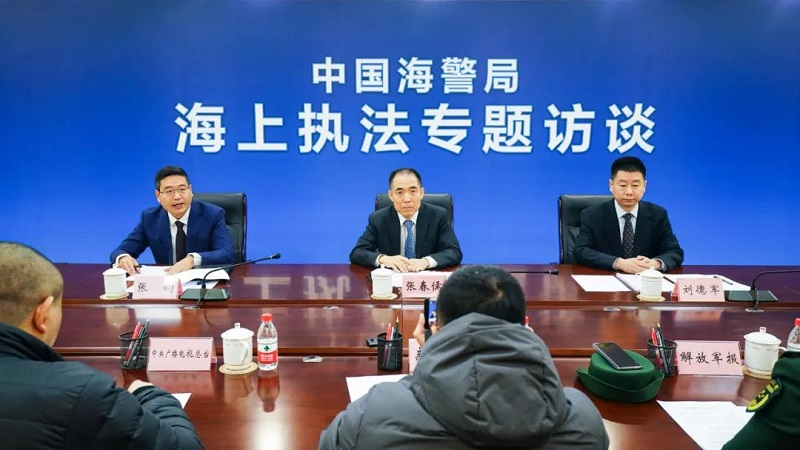
Zhang Jun: Friends from the press, good morning! Welcome to the interview on maritime law enforcement of China Coast Guard.
The past year witnessed China Coast Guard making strenuous efforts to reshape and transform itself. Coast guard units of all levels focused on the central task of maritime law enforcement and presented a brilliant performance sheet. A batch of major cases that we solved exerted widespread impacts at home and abroad, and law enforcement by China Coast Guard became a highlight in building a “law-based China”. To respond to public concerns and enhance China Coast Guard’s public credibility and influence, we’ve invited Chief of Staff Zhang Chunru and Deputy Chief of Staff Liu Dejun of the Law Enforcement Department as well as officers from relevant organs of China Coast Guard to answer questions.
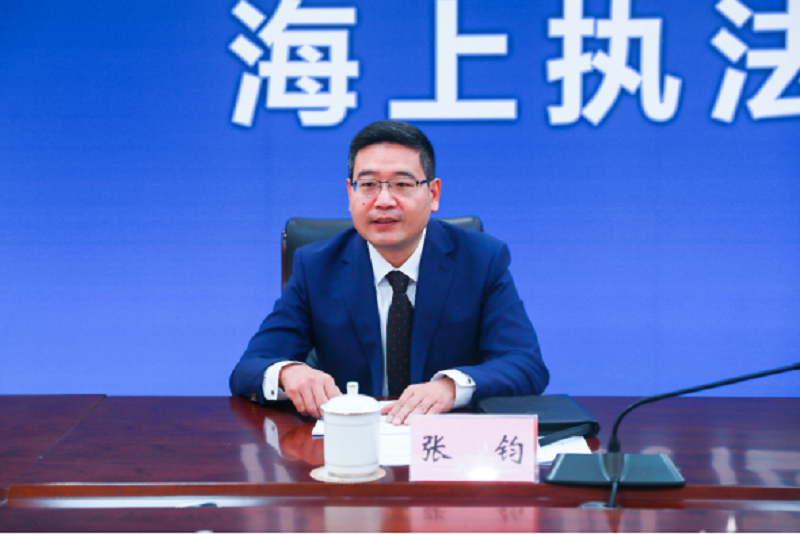
Now I’ll first give a brief introduction on the performance of duties of China Coast Guard.
China Coast Guard is a national administrative agency tasked with safeguarding maritime rights and interests and enforcing the law on the sea. It has branches and directly subordinate bureaus in coastal regions according to administrative division and task areas, and also has provincial and municipal bureaus and local workstations according to local jurisdiction. A deployment layout covering all terrains and all waters under Chinese jurisdiction is primarily in shape.
On June 22, 2018, the Standing Committee of the National People’s Congress adopted the Decision of the Standing Committee of the National People's Congress on the Exercising of the Marine Right Safeguarding and Law Enforcement Functions and Powers by China Coast Guard. The Decision authorized China Coast Guard to safeguard rights on the sea and perform seven law enforcement functions, which referred to fighting maritime violations and crimes, preserving maritime safety and security, development and utilization of marine resources, marine ecological and environmental protection, management of marine fishery resources, carrying out anti-smuggling tasks on the sea, and coordinating and guiding local maritime law enforcement. When fighting maritime violations and crimes and preserving maritime safety and security, China Coast Guard exercises the law enforcement authority legally stipulated for public security organs; when enforcing the law concerning the development and utilization of marine resources, marine ecological and environmental protection, management of marine fishery resources, and maritime anti-smuggling, it exercises the law enforcement authority legally stipulated for administrative organs. China Coast Guard has also formed coordination mechanisms with the Supreme People’s Procuratorate and Supreme People’s Court, as well as ministries of State Council including Ministry of Public Security, Ministry of Natural Resources, Ministry of Ecology and Environment, Ministry of Agriculture and Rural Affairs, and General Administration of Customs.
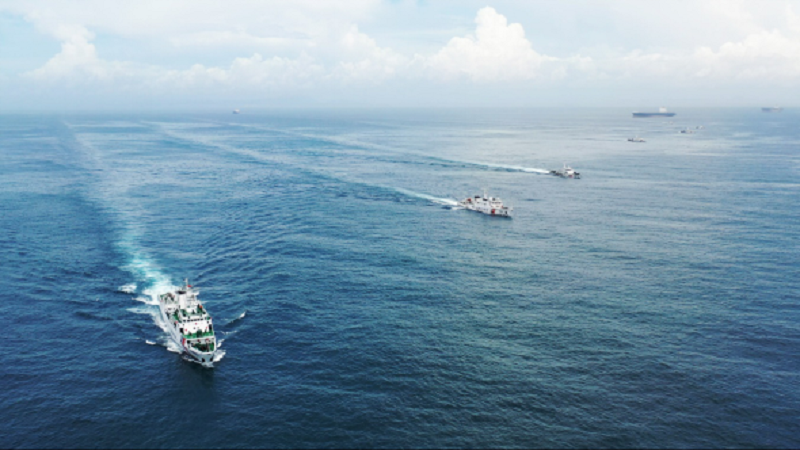
In the past year, China Coast Guard, bearing in mind its original aspiration to enforce the law for the people, courageously performed its mission and safeguarded the national sovereignty, security and maritime rights and interests, living up to its commitment to “guarding the beautiful oceans, building a peaceful China”. Now I’ll briefly introduce the special law enforcement operations we carried out in 2020.
The “Blue Sea 2020” special law enforcement operation for the protection of marine ecology and environment. This operation aimed at all-round coverage and full-process regulation in eight aspects, including maritime engineering and construction projects, offshore oil exploration and exploitation, dumping into the sea, sea sand mining and transportation, and discharge of land-sourced pollutants. It hit hard on prominent illegal actions such as damaging coral reefs, illegal mining of sea sand, illegal dumping, coastline damage, and wetland encroachment.
The “Flashing Sword 2020” special operation for summer fishing moratorium. Considering the work characteristics during the summer fishing moratorium, this operation focused on six aspects – regulation of fishing ships at port, maritime patrol and inspection, rectification of fishing ships without a name, number, certificate or port of registry, management of foreign-related fishing ships, law enforcement in key areas, and specific regulation of fishing activities. It comprehensively intensified the monitoring and regulation of fishing ships and ports and seriously suppressed various criminal activities through a combination of measures, including source control, berth monitoring, port and maritime patrol, and concentrated crackdown actions.
The “Deep Sea Defender 2020” special operation for international submarine optical cables. This operation focused on marine production activities in key sea areas and hotspot issues. During the operation, China Coast Guard investigated and dealt with activities in submarine cable protection zones that might undermine cable safety, such as sand mining, drilling, piling, anchoring, bottom trawling and netting, lending a heavy blow to cable-damaging violations and crimes.
The “National Sword 2020” special operation against maritime smuggling. This operation focused on key taxable commodities such as finished oil, contrabands concerning guns and drugs, grain, agricultural and non-staple food, wildlife and products, imported waste, fake and shoddy anti-pandemic supplies, and new types of smuggling risks. Working in an integrated approach covering crackdown, prevention, management, control and system establishment, the operation blocked the channels of maritime smuggling and curbed the smuggling of key goods across the board.
The “Two Strikes, Two Controls” special operation against drugs. This is a sustained operation launched to comprehensively implement the anti-drug decisions and deployments made by the CPC Central Committee and State Council. Building a maritime prevention and control system, China Coast Guard keeps the high pressure on maritime drug-related crimes with severe measures and punishment, in the all-out endeavor to suppress drug trafficking.
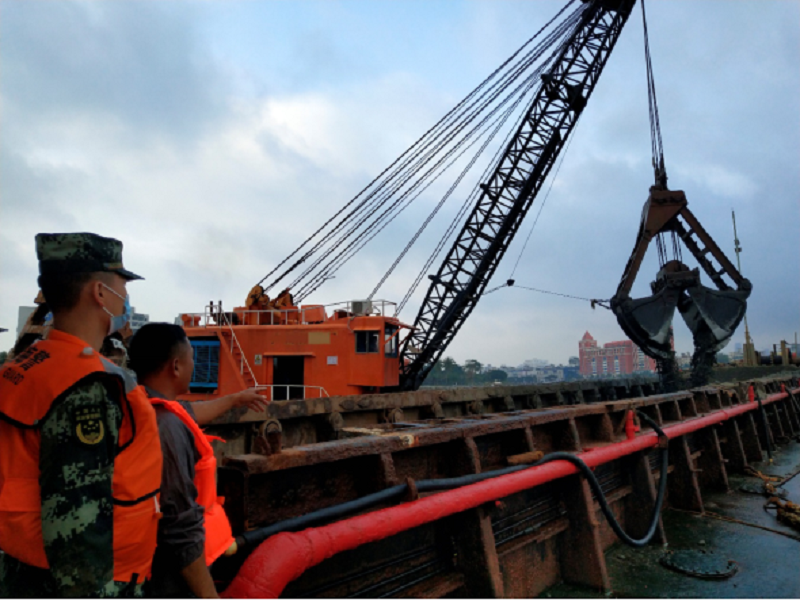
Zhang Jun: Next, we will invite Chief of Staff Zhang Chunru to talk about the general situation of maritime law enforcement in 2020.
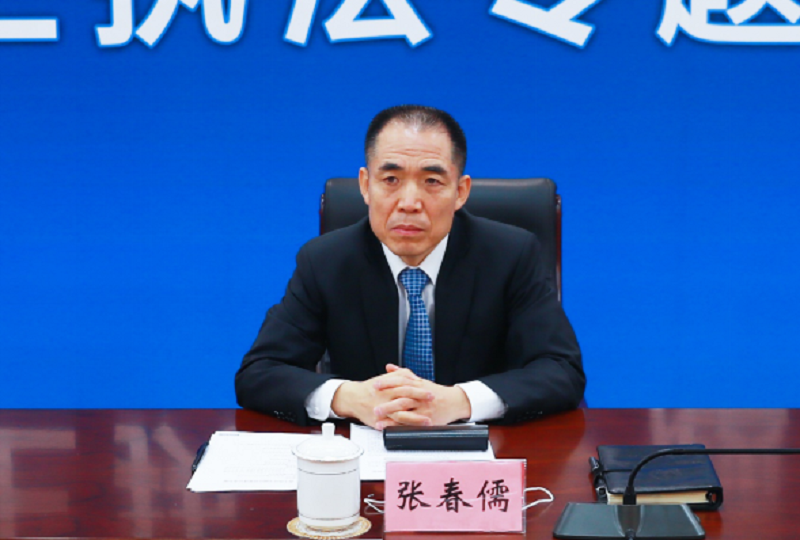
Zhang Chunru: Friends from the press, good morning!
In recent years, China Coast Guard has fully played its leading role in maritime rights protection and law enforcement, closely revolving around key and hotspots issues, public expectations, and its main duties. Following the requirement for rigorous, standard, just and civilized law enforcement, China Coast Guard has continuously deepened the studies of law enforcement tasks, improved its enforcement capabilities, standardized work procedures, and strictly organized enforcement operations. It has fulfilled its duties with high efficiency, taken an active part in maritime disaster relief and rescue, and achieved remarkable results on all fronts. Thanks to these efforts, maritime law enforcement has kept improving and waters under China’s jurisdiction have stayed safe and stable in general. In 2020, China Coast Guard received and responded to 9,652 alarms on the sea, and investigated and solved 774 criminal cases and 3,060 administrative cases. It busted a batch of major cases, including the “4.27” illegal mining case, “7.11” drug trafficking case, and “12.12” refined oil smuggling case.
I. Focusing on drug-related and gang crimes, ensuring people’s life and property safety. There are fewer drug-related or gang crimes on the sea than on land, but they are usually of a large scale and serious societal harm, and are so covert that they are hard to investigate. Keeping a close eye on the greatest public concerns, China Coast Guard has taken harsh and long-term measures and maintained high pressure by launching special operations such as the “Two Strikes, Two Controls”. On August 13, 2020, we, in cooperation with the narcotics department of the Public Security authority, cracked a serious maritime drug trafficking case and seized nearly one ton of ketamine and methamphetamine on site. On December 29, we busted another major case in the South China Sea, seizing hundreds of kilograms of drugs and we are still working to capture the involved criminals on land. These drugs would cause unimaginable harm if released into society.
II. Fighting against smuggling of key commodities, preserving market and economic order. The sea has traditionally been a vital route of smuggling. Smuggling of commodities like cigarettes, frozen products, sugar and refined oil is quite active, with an obvious northward trend and more covert approaches, making it much harder to seize the gangs and destroy the chains. Combining routine management with specific rectifications, China Coast Guard has organized a series of special operations such as the “National Sword”, “Defend” and “National Gate Guard” to crack hard down upon smuggling of various types. We have investigated and solved 1,046 cases, and detained 42,000-ton refined oil, 34,000-ton frozen products, 65,000 boxes of cigarettes and over 8,600-ton sugar, worth RMB 8.9 billion in total. Seeing that maritime smuggling is growing in scale, we were persistent in targeting mother ships, solving major cases and destroying smuggling networks, handled a batch of influential cases, and successfully curbed the smuggling momentum. On December 12, the Guangdong Provincial Bureau and the anti-smuggling department of local Customs busted a serious case of refined oil smuggling, detaining two “mother ships” and about 3,000-ton refined oil, based on which they further found out that a total of 160,000-ton refined oil was involved, worth RMB 800 million.
III. Curbing illegal fishing, preserving orders of marine fishery production. Not all fishing ships are properly certificated. Especially, there is a large number of fishing ships without a name, number, certificate or port of registry, which results in serious illegal fishing that’s hard to manage and control. Targeting prominent issues in illegal fishing, China Coast Guard has rigorously organized routine maritime patrols with land and sea units working in coordination. It launched the “Flashing Sword 2020” special operation for summer fishing moratorium together with the Ministry of Agriculture and Rural Affairs to intensify regulation and law enforcement in important time periods and key sea areas. It also worked with local authorities to strengthen source management of fishing ships and ports and education of fishermen, and seriously attacked illegal fishing of various kinds. As a result, the order of marine fishery production has improved continuously. In the past year, China Coast Guard seized 1,532 illegal fishing ships and solved 277 illegal fishing cases and 614 administrative cases concerning the fishing industry. On July 5, Fujian Provincial Bureau solved a case of illegal fishing of marine products, seizing eight electric trawl-net fishing ships and detaining 50 tons of marine products, including 360kg Tachypleus tridentatus, a level-2 national protected animal.
IV. Tackling prominent issues in marine resources and environment, helping preserve the beautiful sea. The CPC Central Committee and State Council attach great importance to the protection of marine ecology and environment and have continuously stepped up protective efforts, yet illegal dumping into the sea, illegal sea sand mining and use of sea areas against rules remain outstanding and the general situation of protection remains serious. Staying problem-oriented and target-oriented, China Coast Guard has adopted harsh measures in key regions, areas and problems, and carried out regular patrol and special rectification programs in parallel. It launched the “Blue Sea”, “Sea Shield” and other special operations jointly with relevant departments and intensified supervision and inspection to severely hit illegal activities. These efforts have generated notable effects. China Coast Guard has handled 104 marine administrative cases concerning illegal dumping and sea reclamation, and damage of islands, and imposed fines of about RMB 39 million. Considering the sharp gap in gravel supply and demand and the frequent illegal sand mining, China Coast Guard organized an intensive crackdown, focused on specific cases, broke the crime chain, and maintained high pressure. It handled 815 sand-related cases involving 6.81 million tons of sea sand, resolved two serious cases of illegal sand mining, busted two tribal gangs, and arrested 161 suspects, who were engaged in the illegal mining of 125 million tons of sea sand, involving RMB 7.25 billion total. The rampant illegal sea sand mining was suppressed to some extent.
V. Standardizing law enforcement, improving comprehensive maritime law enforcement capability. In the past year, we hosted training sessions on maritime law enforcement standardization and studied and released case-handling guides in the six areas of criminal cases, public security, development and utilization of marine resources, protection of marine ecology and environment, fishing industry and anti-smuggling. We formulated over 20 regulations on the 95110 calling service platform, the use and management of law enforcement venues, and so on, and formed coordination mechanisms with related units to further standardize our work. We accelerated the construction of law enforcement venues, developed and put into use the law enforcement and case-handling system, organized three-tiered training for enforcement coaches, mainstay cadres and law enforcement officers, and conducted education activities in local communities. The grassroots basis for law enforcement is continuously consolidated.
At the moment, maritime law enforcement is generally stable and smooth, but illegal activities such as smuggling, illegal sea sand mining, illegal fishing, use of sea areas against rules, and illegal waste-dumping remain conspicuous. At the same time, great efforts have to be made to prevent pandemic importation by sea. China Coast Guard will stay focused on hotspots and tough issues, intensify regular patrol and regulation, ramp up the clampdown, and implement the “zero tolerance” policy on illegal and criminal activities, so as to safeguard maritime security and stability and contribute to ensuring the beauty and harmony at sea.
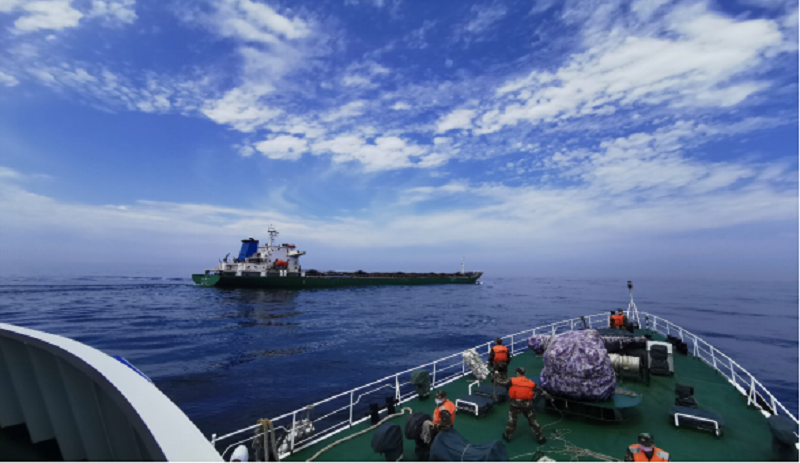
Zhang Jun: Now, we will invite Deputy Chief of Staff Liu Dejun to tell us more about the special maritime law enforcement operations in 2020.
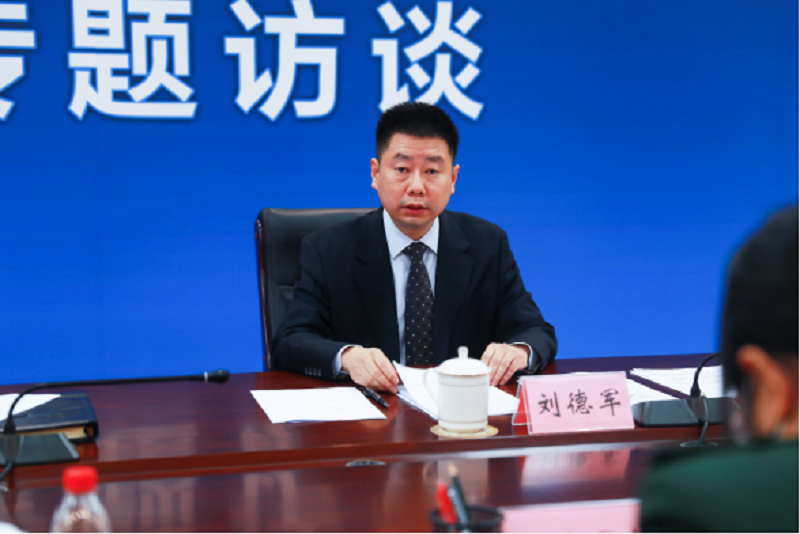
Liu Dejun: Friends from the press, good morning!
In 2020, China Coast Guard worked closely with relevant departments to tackle main and tough issues in maritime law enforcement and launched a series of special operations such as Blue Sea, Flashing Sword, Deep Sea Defender, Two Strikes and Two Controls against drug-related crimes, National Sword, Defend, National Gate Guard, and anti-smuggling. Now I’ll give a brief introduction to some of the operations and typical cases.
We launched the “Blue Sea 2020” special law enforcement operation for the protection of marine ecology and environment
To advance the development of marine ecological civilization, strengthen the supervision and inspection of marine ecology and environment, and address prominent issues of marine pollution and ecological damage, China Coast Guard, in conjunction with the Ministry of Ecology and Environment, Ministry of Natural Resources and Ministry of Transport, carried out the “Blue Sea 2020” special operation for the protection of marine ecology and environment from April 1 to November 30. Authorities of all levels comprehensively reinforced supervision and inspection of key projects, in hotspot regions and at key links. Specifically targeting major problems, they inspected marine engineering and dumping projects 1,125 times, islands 1,228 times and marine reserves 358 times, boarded for inspection oil exploration and exploitation facilities 391 times, and guided the rectification of 19 safety hazards. They also handled 45 illegal dumping cases, confirmed about 1.2 million cubic meters of dumped wastes, cracked 2 cases of illegal hunting and sale of precious and endangered wildlife, and seized 113kg red corals.
Eyeing illegal sea sand mining, China Coast Guard conducted all-round, incessant patrols in key sea areas and along main routes. It inspected Taiwan Shoal, the Yangtze Estuary and the Pearl River Estuary, where illegal sea sand mining and transportation was frequent, organized intensive crackdowns with the help of judicial approaches, specifically targeted typical or major cases, and crushed crime chains. It solved 621 sand-related cases, including the “4.28” and “4.27” cases of a large scale and serious consequences.
Here are two typical cases.
The first is the “4.27” serious illegal sand mining case. In March this year, Fujian Provincial Bureau learned about the rampant illegal mining and sale of sea sand by a gang led by Chen. The agency sent a taskforce to Ningde, Xiamen and Zhangzhou, where it conducted careful investigations for more than six months, and obtained a clear picture of the gang’s organizational structure, division of duties, main locations of activity, modus operandi and capital flow. On November 19, Fujian Provincial Bureau controlled the gang members in those cities and the ships involved simultaneously. It detained seven ships and about 35,000-ton sea sand, confiscated more than RMB 2 million and froze another RMB 20 million or so, and arrested all the key members, successfully taking out the tribal gang of illegal sea sand mining. Primary investigations showed that the gang was suspected of illegally mining 75 million tons of sea sand worth more than RMB 5 billion, featuring the largest amount of sea sand and money of similar cases on record.
The second is the “8.02” case of illegal hunting and sale of precious and endangered wildlife. At the end of November last year, Fujian Provincial Bureau learned about the illegal hunting of red corals by a gang in Xiapu County, Ningde City, using retrofitted ships. The bureau formed a taskforce immediately and began extensive investigations with Xiapu as the center. Based on careful investigation, comparison and analysis, the taskforce figured out the gang’s hunting cycle, mode of transportation and other important information. In the early morning of August 2, it seized the ship Zhecangyuxiu 00036 transshipping red corals in waters near Fuding, capturing 5 suspects and detaining 113.5kg red corals. Later, law enforcers went to Zhejiang and checked and detained a fishing ship involved in the case at the Xiaguan shipyard.
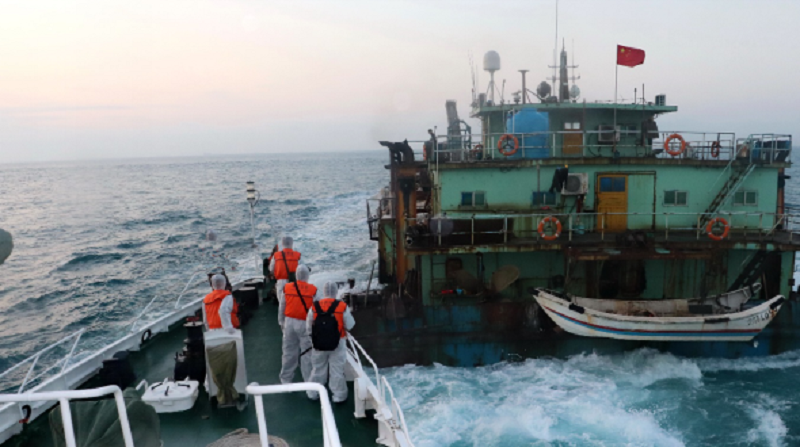
We launched the “Flashing Sword 2020” special operation for marine fishery summer moratorium.
China began to implement the summer fishery moratorium policy in 1995. After 2017, the country implements a fishing moratorium of 3-4.5 months, starting on May 1 every year, in the Bohai Sea, Yellow Sea, East China Sea and waters north to 12 degrees north latitude of the South China Sea (including Beibu Gulf). To effectively practice the system and maintain order during the moratorium, China Coast Guard and the Ministry of Agriculture and Rural Affairs jointly conducted the “Flashing Sword 2020” special operation. Coast guard units of various levels worked closely with local fisheries administration departments, kept a close eye on key sea areas and time periods, strengthened maritime patrol and regular management and control, and maintained a high pressure on criminal activities. They dispatched vessels 12,290 times, boarded and inspected fishing ships 4,307 times, seized 1,493 fishing ships involved in illegal activities, outlawed 273 ships without a name, number, certificate or port of registry, confiscated 4.29 million kilos of catches, and handled 213 fishing-related criminal cases.
I’ll give you more details about the “7.5” typical case of illegal fishing of marine products.
In early June this year, Xiamen Municipal Bureau learned that about ten Zhangzhou-registered fishing ships gathered in sea areas of Xiamen and Zhangzhou and fished aquatic products with electric trawl net explicitly prohibited in the country. On July 5, the sea and land-based units of Xiamen and Zhangzhou Municipal Bureaus seized eight electric trawl-net fishing ships and 31 suspects, and confirmed about 50 tons of aquatic products, including 360kg Tachypleus tridentatus, a level-2 national protected animal, involving around RMB 4.2 million in total. They also captured four people buying the products and smashed up a purchasing spot.
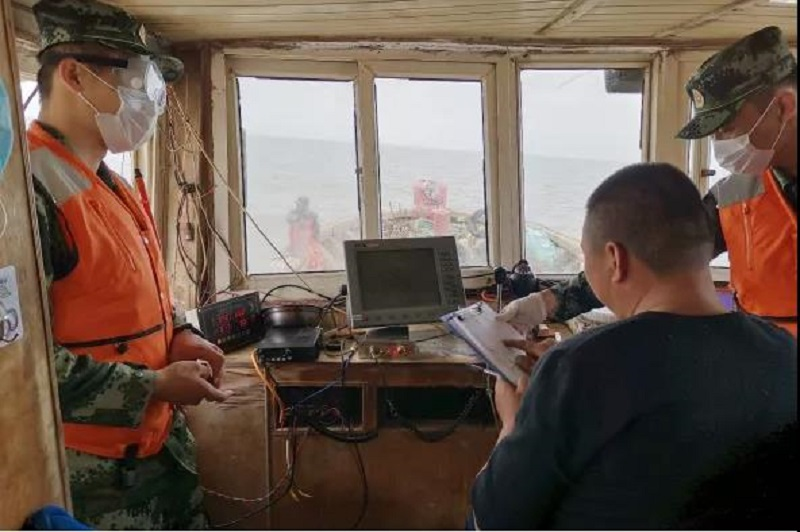
We launched the “Deep Sea Defender 2020” special operation for the protection of international submarine optical cables.
In recent years, marine economic activities have increased steadily and marine operations are more frequent, making it hard to protect and maintain the submarine cables. Early this year, some international submarine cables had several break-offs. To better protect and maintain the cables, China Coast Guard launched a half-month-long “Deep Sea Defender 2020” special operation in late April. Coast guard units of all levels focused on key sea areas and hotspot issues, made scientific deployments, and took coordinated, precise and speedy actions. They increased the patrol of cable protection zones, intensified inspection of passing ships, and dealt with those suspected of breaking the law and regulations, severely hitting violations and crimes detrimental to submarine cables. During the special operation, we dispatched vessels 328 times, drove off 272 ships of different kinds that were operating in cable protection zones, and boarded 24 ships for inspection. In cooperation with the Ministry of Industry and Information Technology, we sent 730 million messages about submarine cable protection and law popularization to coastal residents to sharpen their awareness in that regard. After the special operation wrapped up, China Coast Guard established and improved a regular cable protection system with daily patrol as the main approach and special programs and joint rectification as auxiliary measures, and deployed vessels to enhance cable protection in daily law enforcement. In mid-September, Zhejiang and Hainan Provincial Bureaus successively solved two cases of damaging military communication facilities, which was a strong deterrence to the criminals.
Here is a typical case of the Ship Zhejiaoyu 60005 damaging military communication facilities.
On September 7, Zhejiang Provincial Bureau received a call that a military communication cable had an outage perhaps due to ship activities. China Coast Guard ordered its No.1 Directly Subordinating Bureau and Zhejiang, Jiangsu and Fujian Provincial Bureaus to check the situation simultaneously on sea and on land. On September 11, the suspected Ship Zhejiaoyu 60005 was successfully seized in sea areas northeast of Zhoushan. Investigations showed that when the ship lifted its anchor in the submarine cable protection zone, its anchor hooked up with the cable and it just cut off the cable, left the anchor and fled.
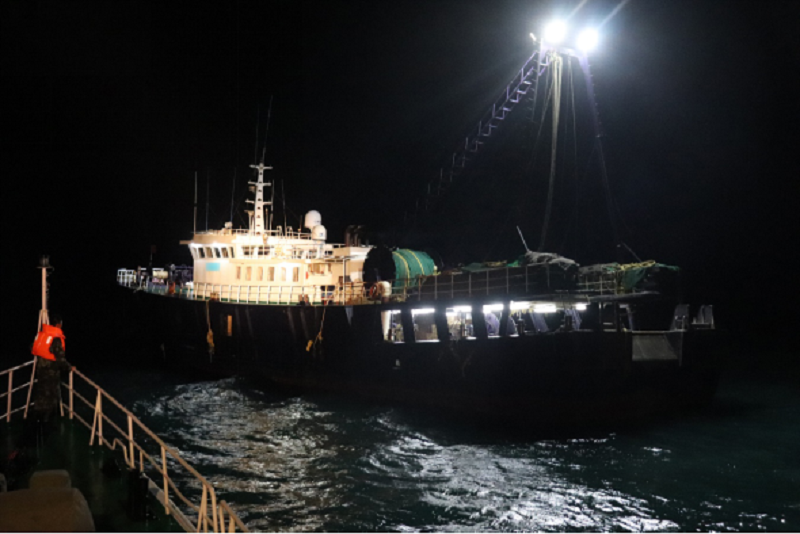
We launched the “National Sword 2020” special operation against maritime smuggling.
To resolutely implement the important instructions given by central leaders on fighting smuggling and preventing and controlling the pandemic, China Coast Guard, focused on major problems the central government, the society and the public are concerned about, deployed the “National Sword 2020” special operation against maritime smuggling. It worked with relevant departments to carry out the “Defend” operation against the smuggling of refined oil and the “National Gate Guard” operation against the illegal import of food. In the past year, China Coast Guard solved 1,046 smuggling cases, detained 42,000 tons of refined oil, 34,000 tons of frozen products, 65,000 boxes of cigarettes, 8,687 tons of sugar and numerous other sundries and imported wastes, which amounted to RMB 8.9 billion, a year-on-year increase of 62%.
I’ll mainly talk about two typical cases.
The first one is the “12.12” serious case of refined oil smuggling. Based on more than three months’ investigations, Guangdong Provincial Bureau and the anti-smuggling bureau of Zhanjiang Customs took action on December 12 and 13 in Guangdong’s Maoming, Zhanjiang, Shantou, Guangzhou and Yangjiang as well as relevant sea areas. They seized 85 suspects, smashed five smuggling gangs, detained two mother ships and two barges, seized about 3,000-ton smuggled goods, froze RMB 2.19 million, and primarily confirmed 160,000-ton refined oil involved, worth RMB 800 million in total. The case also involved RMB 400 million tax evasion.
The second one is the “8.21” serious case of cigarette smuggling. On August 21, the No.2 Directly Subordinating Bureau of China Coast Guard seized two ships in the East China Sea, on which they found 10,579 boxes (528,932 cartons) of cigarettes worth nearly RMB 90 million, and seized 11 suspects.
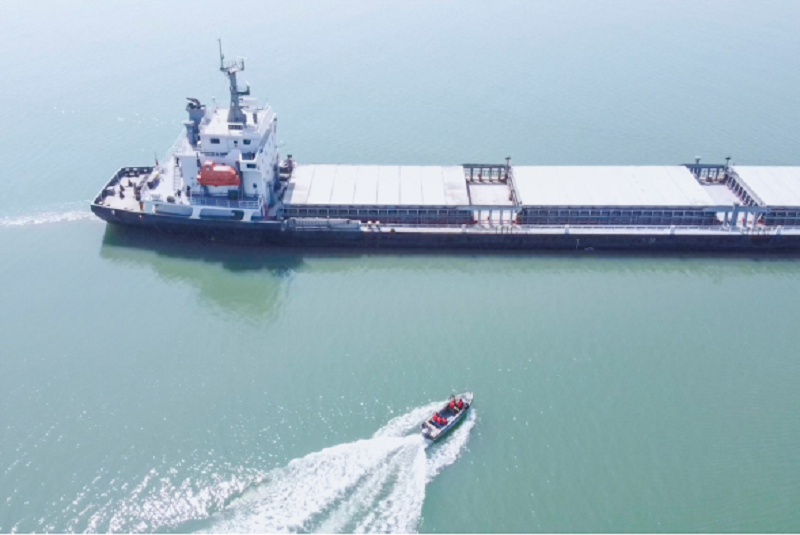
We launched the “Two Strikes, Two Controls” special operation against drugs.
Because of the general international environment and the domestic situation of drug-related crimes, maritime drug control becomes increasingly complicated and severe as drug trafficking activities get more organized and professional, domestic and foreign drug dealers work more closely together, and the drug types and drug-dealing modes become more diverse. In the past year, China Coast Guard consistently advanced the “Two Strikes, Two Controls” special operation against drugs. We cracked 4 cases, including 2 targeted by the Ministry of Public Security, seized about 1-ton ketamine, methamphetamine and other drugs, detained 3 ships and 6 cars, seized 16 suspects and 12 drug addicts, and busted 2 drug rings.
There are two typical cases under this operation.
The first one is the “7.11” drug smuggling case. In early May, the Ministry of Public Security reported that a drug ring was planning to smuggle a large number of drugs from the Golden Triangle to China by sea, and was contacting providers and raising money. China Coast Guard guided the Fujian Provincial Bureau to carefully collect and analyze information and learned that a man named Zhu in the ring planned to receive the drugs with a general cargo ship. In the early morning of August 13, China Coast Guard and the Narcotics Bureau of the Ministry of Public Security jointly directed the No.5 Directly Subordinating Bureau and Fujian Provincial Bureau to ambush in the northwestern waters of the South China Sea. After the drug-carrying ship entered that area, we approached stealthily, quickly boarded it, controlled the six suspects onboard, and seized nearly one ton of ketamine and methamphetamine. It was the largest amount of drugs we have seized in the Nansha sea area in a single case.
The second one is the “6.10” case of selling and transporting drugs, which was on the Ministry of Public Security’s radar. From July 21 to August 7, Hainan Provincial Bureau, the Technical Investigation Team of Hainan Public Security Department, and Wanning Public Security Bureau took action on this case. They seized 8 suspects, 12 drug addicts, 331g methamphetamine and many drug-using tools, and detained 6 vehicles, successfully cracking a drug ring that has been active in Haikou, Chengmai, Danzhou and Lingao for many years.
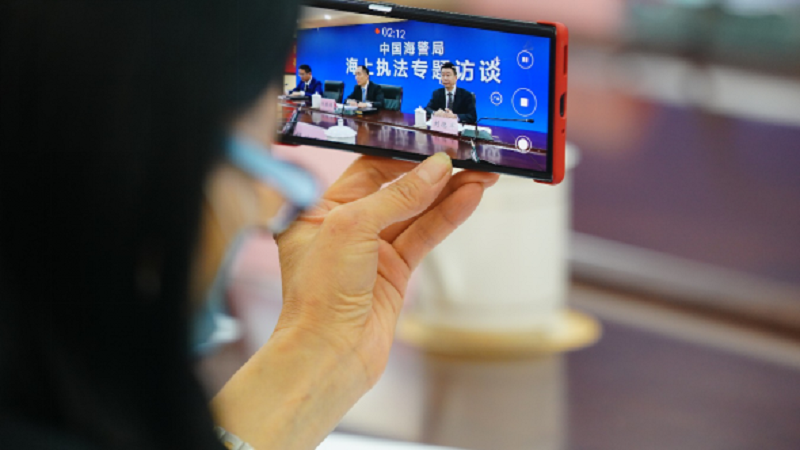
Zhang Jun: We will take questions now.
Reporter from CCTV: The national crackdown on gang crimes has come to the final stage. Unlike police on the ground, China Coast Guard is the mainstay of fighting gang crimes on the sea. Can you tell us more about that?
Zhang Chunrun: In January 2018, the CPC Central Committee and State Council issued the Notice on Launching the Special Criminal Syndicate Combat, which kicked off the three-year-long operation across the country.
In the past three years, China Coast Guard has made strenuous efforts to tackle difficult issues, blind zones and key areas and cracked hard down on mafia-like gangs that bully the public and other ships. We have combined these efforts with other special operations against smuggling, drugs and illegal sea sand mining, and worked closely with local law enforcement agencies and maritime units to fight criminal activities in key marine industries that mafia-like gangs are likely to engage in, such as “sea bullying”, “fishing bullying” and “shipping bullying”. We have solved several grave cases like the “8.15”, “9.21” and “9.29” cases, striving to create a satisfactory maritime security environment for the people.
So far, China Coast Guard has followed on 193 clues about mafia-like gangs and activities, solved 36 cases, seized 142 suspects, busted 10 gangs, detained 33 ships and 1 aquafarm, and rectified 3 illegally occupied fisheries, lending a heavy blow on maritime mafia-like crimes. Fujian and Zhejiang Provincial Bureaus have been titled national advanced units for fighting mafia-like crimes.
Reporter from Legal Daily: The spokesperson just said that coast guard units of all levels exercised different authorities of law enforcement when discharging their duties. What measures has China Coast Guard taken to standardize their law enforcement?
Liu Dejun: China Coast Guard badge was officially used on January 1 this year. Taking that as a starting point, we will continue to intensify the standardization of law enforcement and enhance our ability of performing our duties in accordance with law and our public credibility in enforcing the law.
We have accelerated the establishment of a legal system for maritime rights protection and law enforcement. The functional positions, authorities, support and supervision of Coast Guard units of various levels have been further specified, and the division of duty between them and other maritime departments is clearer and their coordination smoother. We have actively carried out law enforcement standardization training, shot videos to demonstrate what standardized law enforcement is at three types of venues, and released regulations on group discussion of cases and use and management of law enforcement and case-handling venues, thus further improving the system.
Working in a problem-oriented and people-centric approach, we emphasize full-process supervision of law enforcement, open law enforcement, and back-tracing of accountability. Efforts are made to address some hidden hazards, such as non-compliance with standard procedures and low standards for case handling, and a series of measures are taken to tackle outstanding issues, ranging from specific guidance, list-making, and resolution of long-pending cases to procedure standardization, example setting, and intensified supervision. As a result, the supervision of law enforcement is more comprehensive, precise and authoritative, making sure the exercise of power is open and transparent.
Reporter from Xinhua News Agency: China Coast Guard is an important window of foreign exchanges. Can you brief us on its cooperation with international law enforcement agencies this year?
Zhang Jun: In the spirit of open, pragmatic and win-win cooperation, China Coast Guard has paid close attention to international exchanges and cooperation on maritime law enforcement. Its cooperative relationship with foreign counterparts in surrounding and regional countries has strengthened, and its capability of participating in regional maritime governance has further improved.
In the past year, China Coast Guard earnestly acted on the initiative to “build a maritime community with shared future”. We took an active part in the table-top exercise of maritime law enforcement in the South China Sea and the council of Regional Cooperation Agreement on Combating Piracy and Armed Robbery against Ships in Asia Information Sharing Center (ReCAAP ISC). We also participated multilateral meetings on maritime law enforcement cooperation mechanisms such as the seminar on ensuring just and humanitarian treatment for fishermen in implementing the Declaration on the Conduct of Parties in the South China Sea, contributing the wisdom of China Coast Guard. We participated in the China-ROK, China-Vietnam Coast Guard joint patrol and fisheries law enforcement patrol in the high seas of the North Pacific, honoring China’s solemn commitment as a responsible country to regional maritime governance.
During the special period of the COVID-19 pandemic this year, we innovated the mode of international law enforcement cooperation, set up the “video conference room for international cooperation”, and conducted “cloud cooperation” in various forms such as by phone, letter, email and video conference. We stayed in close contact with relevant countries, discussed cooperation documents, exchanged views on maritime situations, coordinated maritime operations, and encouraged and supported each other. The “circle of friends” on maritime law enforcement cooperation has been further consolidated and expanded.
Reporter from Guangming Daily: We learned that China Coast Guard has set up workstations in coastal districts and counties. What steps has China Coast Guard taken to consolidate the foundation for law enforcement?
Zhang Chunru: Given the weak foundation for maritime law enforcement, we have quickened our steps to address urgent issues and made progress this year.
Regarding basic infrastructure, we advanced the construction of standard grassroots units and standardized the configurations at law enforcement and case-handling venues. We expedited the IT application in law enforcement, developed the case-handling system and transmitted cases online. The 95110 calling service platform is now in service at grassroots Workstations and an alarm would trigger four-level coordination, further raising the work efficiency.
Regarding basic information, we have conducted a comprehensive collection of basic information in our jurisdiction since the beginning of this year, and established and improved the maritime law enforcement database. At the same time, we are coordinating to connect with the maritime AIS, fishing ship dynamic monitoring system, and submarine cable monitoring system, so as to support maritime law enforcement with more comprehensive information.
Regarding capability building, we have reinforced the three-layered training mechanism, covering professional training for Coast Guard investigators, intensive training for workstation chiefs, and rotational training for front-line law enforcers, in a bid to enhance their competence and capability. Strictly controlling the qualification for maritime law enforcement, we have organized more than 6,000 officers to sit the primary qualification exam, and built the talent pool for maritime law enforcement, steadily strengthening the team.
Reporter from China News Service: The year 2020 is very special with COVID-19 sweeping across the world. In face of the risk of relapse at home, what has China Coast Guard done to prevent and control the pandemic at sea?
Zhang Jun: During the pandemic prevention and control this year, we, upholding the policy of “preventing importation outside and relapse inside”, joined hands with the Ministry of Public Security in a special operation against stowaway, especially focused on key ports and wharves. Through intensified patrol and control in key sea areas and inspection of suspicious ships, we solved 25 stowaway cases and seized 224 suspects, effectively forestalling the importation of COVID-19 cases from the sea. On August 23, under the unified command of the higher-level department, Guangdong Provincial Bureau solved a case of illegal border-crossing, seized a speed boat, and captured over ten suspects, keeping the Guangdong-Hong Kong waters safe and stable.
Considering the current status of the COVID-19 pandemic, we have consistently reinforced the check and attack of cold-chain food smuggling, and cumulatively detained 34,000 tons of frozen products, reducing the risk of importing the virus via smuggled frozen goods to the largest extent. In October this year, Hainan Provincial Bureau and the anti-smuggling department of Haikou Customs jointly solved a massive case of smuggling frozen products, during which they seized more than 5,000 tons of frozen goods and successfully rooted up a gang that featured a clear division of work – organization and command overseas, transportation by sea, and reception and distribution in China.
Reporter from China.com.cn: We learned from China Coast Guard’s official new media that it has taken a series of steps in law enforcement coordination this year. Please elaborate on that.
Liu Dejun: We have formed law enforcement coordination and cooperation mechanisms with public security, procuratorial and judicial organs as well as the Customs, fisheries administration, maritime and tobacco authorities. We have also countersigned and issued the methods of coordination and cooperation with the Ministry of Public Security, Ministry of Natural Resources, Ministry of Ecology and Environment, Ministry of Agriculture and Rural Affairs, Ministry of Transport, and General Administration of Customs.
Published in February this year, Notice by the Supreme People's Court, the Supreme People's Procuratorate, and China Coast Guard of Issues Concerning Jurisdiction of Maritime Criminal Cases clearly divid